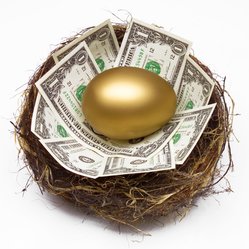Advantages to Pension Fund Investing
A retirement pension fund is the typical method of retirement savings and investing. For this reason, it’s often viewed as the safer investment bet when you’re planning for your retirement. Pensions rarely lose money that is invested into them, although they may not grow dramatically, either. There are also extensive tax benefits involved when putting your retirement investing into a pension fund. If you choose to use a company pension program, the money you contribute towards your retirement will be pre-tax.

While this reduces your total taxable income in the present, you will be forced to pay taxes on your retirement savings later in life when you go to withdraw. On the other hand, if you invest in a private pension fund, the likelihood that you’ll invest from your net-income (or post-tax income) is high, and your withdrawals during retirement will be completely tax free. Regardless of which fund you choose, having tax benefits on the front or back end of your investing is a definitive benefit of pension fund investing.
Another advantage to pension funds is that, in many cases, an employer will contribute an equal amount up to a certain percentage of your pay towards your pension fund. These match programs can drastically increase your overall retirement savings, and if you contribute wisely at the beginning of your career, you’ll be able to earn interest on a greater amount of funds invested for a longer period. These extended earnings have the potential to set you up nicely in your retirement. Disadvantages to Pension Fund Investing
While pension funds do offer a secure way to invest and save for retirement, they can also be disadvantageous. The most notable disadvantage of pension funds is the lack of flexibility in when you can access your money. In most cases, you won’t be permitted to withdraw funds from your pension until you’re 55, and even then you’re subject to taxation. For those who are interested in possibly retiring early or taking an untraditional retirement in which they start a second career, go back to university, or choose to live internationally, these pension fund withdrawal limitations may be restricting.
Additionally, the performance of pension funds depends entirely on the investment of your assets. If you invest poorly, or in too conservative a way, your funds may not grow much, if at all. This means that your pension fund is essentially a glorified savings account with employer contribution and better than average interest. Still, for many, this isn’t enough for them to live the way they want to during their retirement. Advantages to Property Investing
When you choose to invest your retirement funds in property rather than a traditional pension fund, you have significantly more flexibility when managing your investments. For example, you can monitor the real estate market to select the perfect property investment, and from there you can choose to either live there full time, use the property as a vacation space, or make even more money on your investment by setting it up as a rental property. If you ever want to sell your property, it is a physical asset and you have the capability to do so. Whether you’ve decided you’d like to use your funds earlier than planned, or you are ready to invest them in another market, selling property is much easier than cashing out your pension fund early.
Additionally, the property market has more flexibility with the levels it can fluctuate. You can purchase a property in a buyer’s market and sell for significantly more in a seller’s market, often making much more on your investment than you would have made had you put the same funds in a traditional pension fund. Disadvantages to Property Investing
Admittedly, property investing is much less stable than pension funds. Property markets tend to fluctuate with some regularity and little to no warning. There are also more maintenance expenses and up front taxes involved with a property investment. These upfront expenses can often be a deterrent to those looking for investment opportunities, and few view an expensive property as a viable means to save for retirement as a result. Despite the inherent volatility of property investing, it can often be an excellent vehicle for those looking to invest or to access the return on their investments sooner than a pension fund would allow.
Should You Consider Overseas Property?
The answer to that is a glowing “yes, absolutely”. If you are going to go with property investing in spite of the inherent risk you should consider doing so abroad. Some countries like Romania can offer staggering returns of 7, 8 or even 9% annually. You could potentially diversify your overseas property investments over 4-5 developing countries (in which homes are very cheap in, with high annual rental yield) and minimize the risk, and be much better off upon pension.
You don’t have to worry about dealing with the nitty gritty. There are professionals in the field that specialize in dealing with foreigners. Lawyers, property agents, and international money transfer companies deal with tens of thousands of clients just like yourself.
What is the Bottom Line?
To each his or her own. Both options are valid, it just depends on how risk averse you are, and of course, your financial status. No matter whether you choose to invest in property or a pension fund, be sure to consult a qualified adviser who can help you make the wisest choice based on every factor affecting your decision.
Retired Brains does not offer direct financial investment advice, nor do we affiliate ourselves with any particular financial advisers or firms in the United States or worldwide. Rather, the sole purpose of this article is to present educational, helpful information that can help you decide what kind of investing strategy is right for you in your retirement. If you are interested in learning more about property or pension fund investing, we recommend seeking out a reputable adviser or firm in your area for assistance.
0 Comments
Your comment will be posted after it is approved.
Leave a Reply. |
Archives
July 2024
Categories
All
|
Employment Resources |
Creating Income |
Most Read Pages |
Resources/Info |
|
Copyright 2022 by Retired Brains
|
Disclaimer: We do our best to ensure the information on RetiredBrains.com is accurate and updated at all times; however, we are unable to guarantee the accuracy of all information. We make every attempt to keep the content up to date and factual. For the most current and complete product/service details please verify with the merchant, product, issuer, or service directly via their website or during the buying or application process. Please be aware that RetiredBrains may have a financial relationship with some of the sites included on our Website. RetiredBrains.com may receive compensation if users choose to click on the links located on certain pages of this website and sales and/or leads are generated. If legal advice or other expert assistance is required, the services of competent professional persons should be sought.


 RSS Feed
RSS Feed